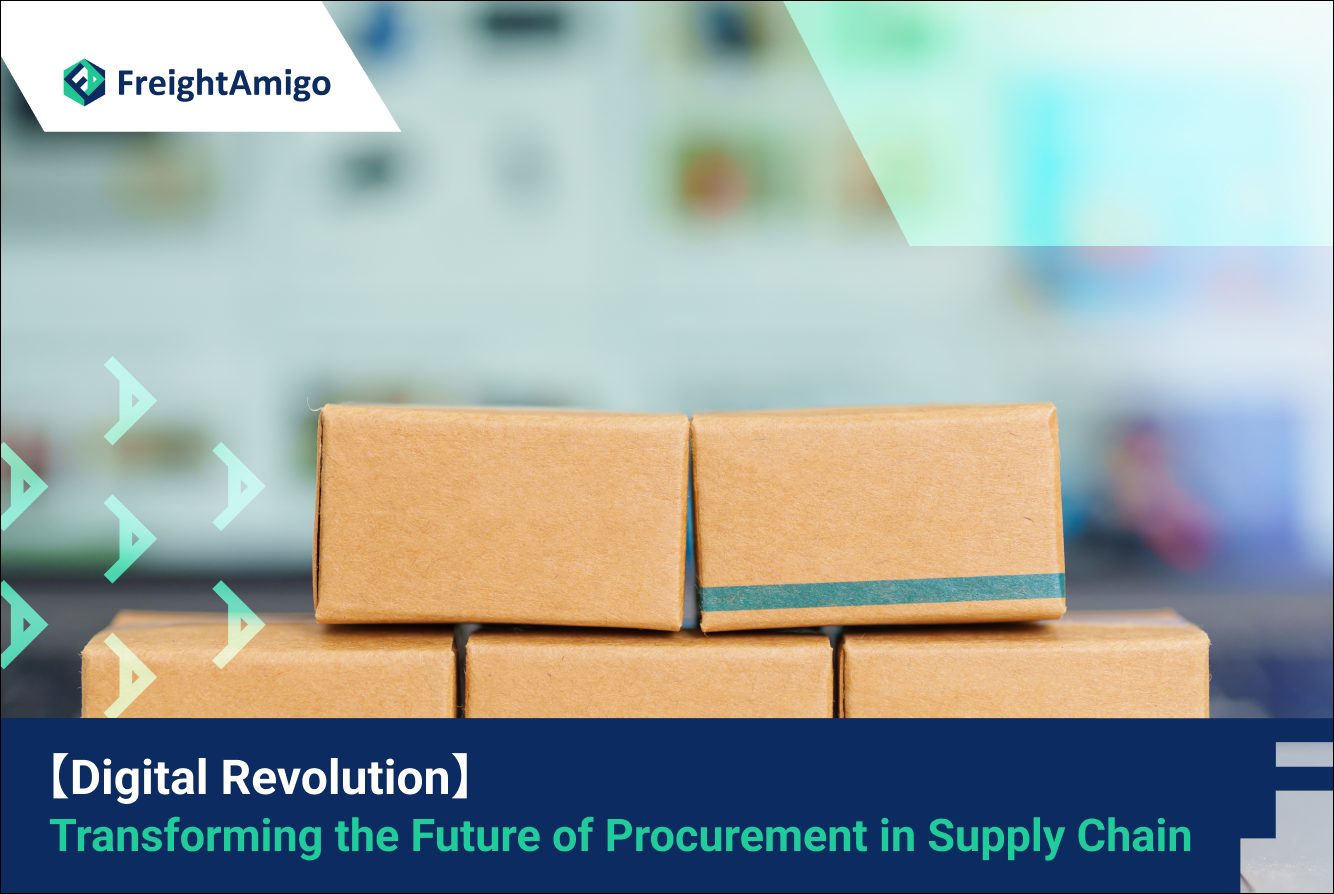In today’s rapidly evolving business landscape, the procurement function within the supply chain is undergoing a significant transformation, driven by the digital revolution. As new technologies continue to reshape industries, procurement is no exception. With advancements in automation, artificial intelligence (AI), and data analytics, procurement professionals now have access to tools and solutions that can revolutionize their operations and drive strategic value.
Author Name:Tiffany Lee – Marketing Analyst at FreightAmigo
Want To Compare The Best Express, Air Freight, Sea Freight, Rail Freight & Trucking Rates So As To Have Better Control On Cost?
The Strategic Shift in Procurement
Traditionally, procurement has been a process-driven function focused on tasks such as sourcing, contract management, and transactional activities. However, the COVID-19 pandemic and the growing emphasis on sustainability have propelled procurement into a more strategic role. Organizations are now recognizing the need to leverage technology and digital solutions to mitigate disruptions, enhance supplier relationships, and ensure compliance with environmental, social, and governance (ESG) standards.
According to PwC’s 2022 Digital Procurement Survey, the majority of chief procurement officers (CPOs) understand the transformative power of digitalization. They view digital transformation as the second most critical procurement strategy, surpassed only by supplier collaboration. The survey also reveals that 77% of companies have already implemented source-to-pay digital solutions, indicating that digitalization is no longer a luxury but a crucial operational necessity.
The Power of Digital Procurement
Digital procurement solutions offer organizations the ability to streamline their processes, gain actionable insights from data, and optimize supplier relationships. These solutions empower procurement professionals to focus on strategic tasks that require human expertise, while automation takes care of repetitive and time-consuming activities.
Jim Kilpatrick, Global Supply Chain & Network Operations Leader for Deloitte, emphasizes the importance of digitalization in maintaining competitiveness and agility. He highlights the role of AI in automating tasks such as invoice processing, enabling organizations to identify and resolve problems without human intervention. This shift towards digital optimization is explored in Harvard Business Review’s paper, “Digital Optimization Paves the Way to Strategic Supplier Management,” sponsored by Amazon Business. The paper highlights the challenges faced by organizations in supplier management and the benefits of adopting the right technologies.
The Evolving Role of Procurement Technology
Procurement technology has come a long way from automating repetitive tasks to providing strategic value through seamless integration with human decision-making processes. In the past, machines focused on high-volume, repeatable tasks, relying on robotic process automation and simple bots. However, the landscape has evolved, and procurement technology now encompasses sophisticated solutions that leverage collaboration, supply market research, data analytics, and AI.
Matthew Rose, Procurement Transformation Practice Lead and Partner at KPMG UK, explains that technology is no longer meant to replace humans but to augment their capabilities. Rather than replacing procurement professionals, technology enables them to achieve more with fewer resources and uncover valuable insights. KPMG conducted extensive research to identify top technology providers in the procurement automation and augmentation space, helping clients deploy the right platforms for their digital workforce.
Unlocking the Potential of Digital Procurement
Digital procurement offers a myriad of opportunities for organizations to drive innovation, enhance sustainability practices, and mitigate risks. From engaging with vendors through intelligent negotiation technology to prioritizing procurement projects using advanced AI-based decision-making tools, the potential for unlocking value is immense. Technology enables procurement professionals to make data-driven decisions, foster collaboration within the supply chain, and achieve significant improvements in efficiency.
One example of the transformative power of digital procurement is demonstrated by a global retail client that deployed automated intelligent negotiation technology to address low-value purchases in their tail spend. By rapidly engaging with vendors, negotiating terms, and placing orders, the retailer unlocked millions in untapped savings. Similarly, an oil and gas sector client leveraged advanced AI-based decision-making tools to prioritize procurement projects, allocate resources effectively, and achieve high single-digit improvements in efficiency.
Embracing Digitalization for Future Success
As organizations navigate the digital revolution, procurement must harness digitalization to be a catalyst for change and continuous improvement. The skills required in the future digital procurement workforce will evolve, requiring professionals to adapt, innovate, and transform. The fundamental implications of this digital transformation will impact not only the procurement function but the entire organization, as procurement becomes a strategic enabler of growth and competitive advantage.
Procurement professionals must stay abreast of emerging technologies, collaborate with technology providers, and identify the right solutions to join their digital workforce. The ability to leverage digital tools for collaboration, supply market research, data analytics, and intelligent decision-making will be crucial for driving innovation, sustainability, and risk reduction in procurement practices.
Conclusion
The digital revolution is reshaping the future of procurement in the supply chain. As organizations embrace digitalization, procurement professionals have an unprecedented opportunity to optimize processes, enhance supplier relationships, and drive strategic value. By leveraging advanced technologies such as AI, automation, and data analytics, procurement can become a strategic enabler of growth and competitiveness. Embracing digitalization and continuously evolving with technological advancements will be key for procurement professionals to thrive in the digital age.
In this era of digital transformation, organizations must focus on building a digital workforce that combines human expertise with advanced technologies. By embracing the power of digital procurement, organizations can unlock new opportunities, improve efficiency, and gain a competitive edge in a rapidly evolving business landscape.
There Are Different Options For Cargo Transportation. If You Want To Choose The Most Convenient And Suitable Solution, It Is Best To Have The Full Support Of Logistics Experts! If You Are Planning To Ship Goods Overseas, Please Go To The FreightAmigo Page For Inquiries.
===
Read More:
【Blockchain Technology】A Game Changer for Transparent and Secure Financial Transactions in Logistics
【Financial Technology】Blockchain Revolutionizing the Logistics Industry with Smart Contracts
【Streamlining Supply Chains】The Power of Blockchain in Logistics
===
If you have any inquiries on logistics/supply chain, feel free to contact FreightAmigo now:
Chat with us online OR
Phone : +852 28121686
WhatsApp: +852 27467829



